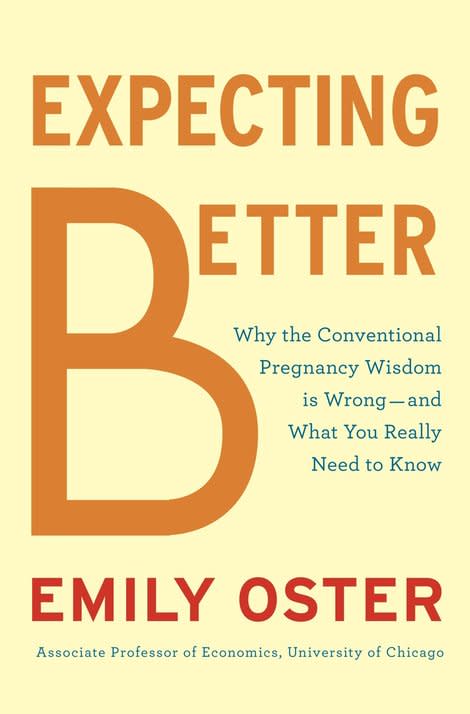‘Expecting Better’ Author Challenges Conventional Pregnancy Advice

As a pregnant woman queuing up for a double latte, or-gasp!- ordering a glass of wine at a restaurant-you can feel as if someone might call social services to report you for child abuse, so ingrained are the rules about what constitutes healthy pregnancy behavior.
Emily Oster, PhD, isn't an obstetrician, she's an economist, but her new book Expecting Better is full of recommendations that buck conventional wisdom about what you can and can't do during pregnancy-including consuming alcohol and caffeine. It's both liberating and sure to raise some hackles.
More on Yahoo:! Flu Vaccine Not Tied to Pregnancy Complications
Oster, who specializes health economics and teaches at the University of Chicago, was inspired to write her book when she became pregnant herself three years ago. "Like Pretty much every other woman, I found I was facing a bunch of new decisions-from the big ones like prenatal testing to the little ones, like whether to have a cup of coffee," she told Yahoo! Shine. "The recommendations I got were often confusing-books would say one thing, my doctor another, the Internet fifty different things."
More on Yahoo!: The Post-Pregnancy Change Kristen Bell Wasn't Expecting
She discovered that pregnancy medical care was, as she wrote in the book, "One long list of rules. In fact, it's a lot like being a child again. There is always someone telling you what to do." While she wasn't an expert on obstetrics and gynecology, she knew her way around a research library, and launched into an analysis of current data on topics ranging from miscarriage and pre-natal screening to weight gain and pain reduction during labor.
Probably her most controversial assertion is that it is okay for women to drink up to one drink a day in the second and third trimesters of pregnancy (and one to two drinks per week during the first trimester). The National Institutes of Health says there is no known safe amount of alcohol during pregnancy and recommends that pregnant women avoid alcohol completely. While Oster says that research shows that heavy drinking can harm the fetus, she writes, "There is no good evidence that light drinking during pregnancy negatively impacts your baby."
However, speaking with the New York Times, Dr. Bill Dunty of the National Institute on Alcohol Abuse and Alcoholism, called Oster's conclusion about alcohol consumption oversimplified. "[It could] potentially lead women to think they are not exposing their fetus to alcohol."

Oster believes that doctors are often dealing with constraints and concerns that go beyond the hard data. "In the case of alcohol, for example," she said, "I have heard many times the fear that if women are told they can have one drink, then they'll have two or three. The fear of this may push doctors to a more conservative approach."
Oster's book doesn't amount to a wholesale rejection of conventional pregnancy wisdom. While her research led her to conclude that some foods, such as sushi, raw eggs, and some deli meats, carried unnecessarily restrictive warnings-especially when obtained from a trusted source-others, including raw milk cheese, were rightly labeled as dangerous. She also determined that pregnant women should indeed avoid smoking and hot tubs as widely recommended, and that outdoor gardening can increase the risk of toxoplasmosis, a parasite that can pass from mother to baby and cause serious health complications. "I also concluded- and this is good news-that many of the risks of invasive prenatal testing like amniocentesis or CVS [Chorionic villus sampling, a genetic test] are overstated.
The aim of 'Expecting Better' isn't to tear down all of the rules, but to help women make smarter decisions. "I think we as pregnant women can serve ourselves by being better informed, which will increase the quality of care," she said. "I'd argue that if women come in as informed as possible, they can have a much more productive interaction with the doctor, which will ultimately lead to a better relationship and better care. That's really where I'm hoping this book will take us."
Also on Shine:
Mother + Daughter: Photographer's Project Highlights Special Bond
